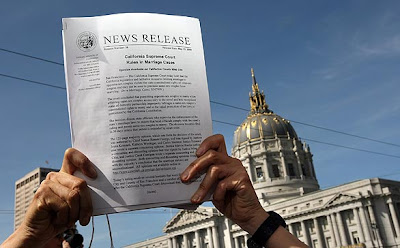From the California Supreme Court's Ruling Today
 Under the strict scrutiny standard, unlike the rational basis standard, in order to demonstrate the constitutional validity of a challenged statutory classification the state must establish (1) that the state interest intended to be served by the differential treatment not only is a constitutionally legitimate interest, but is a compelling state interest, and (2) that the differential treatment not only is reasonably related to but is necessary to serve that compelling state interest. Applying this standard to the statutory classification here at issue, we conclude that the purpose underlying differential treatment of opposite-sex and same-sex couples embodied in California’s current marriage statutes — the interest in retaining the traditional and well-established definition of marriage — cannot properly be viewed as a compelling state interest for purposes of the equal protection clause, or as necessary to serve such an interest.
Under the strict scrutiny standard, unlike the rational basis standard, in order to demonstrate the constitutional validity of a challenged statutory classification the state must establish (1) that the state interest intended to be served by the differential treatment not only is a constitutionally legitimate interest, but is a compelling state interest, and (2) that the differential treatment not only is reasonably related to but is necessary to serve that compelling state interest. Applying this standard to the statutory classification here at issue, we conclude that the purpose underlying differential treatment of opposite-sex and same-sex couples embodied in California’s current marriage statutes — the interest in retaining the traditional and well-established definition of marriage — cannot properly be viewed as a compelling state interest for purposes of the equal protection clause, or as necessary to serve such an interest.A number of factors lead us to this conclusion. First, the exclusion of same-sex couples from the designation of marriage clearly is not necessary in order to afford full protection to all of the rights and benefits that currently are enjoyed by married opposite-sex couples; permitting same-sex couples access to the designation of marriage will not deprive opposite-sex couples of any rights and will not alter the legal framework of the institution of marriage, because same-sex couples who choose to marry will be subject to the same obligations and duties that currently are imposed on married opposite-sex couples. Second, retaining the traditional definition of marriage and affording same-sex couples only a separate and differently named family relationship will, as a realistic matter, impose appreciable harm on same-sex couples and their children, because denying such couples access to the familiar and highly favored designation of marriage is likely to cast doubt on whether the official family relationship of same-sex couples enjoys dignity equal to that of opposite-sex couples. Third, because of the widespread disparagement that gay individuals historically have faced, it is all the more probable that excluding same-sex couples from the legal institution of marriage is likely to be viewed as reflecting an official view that their committed relationships are of lesser stature than the comparable relationships of opposite-sex couples. Finally, retaining the designation of marriage exclusively for oppositesex couples and providing only a separate and distinct designation for same-sex couples may well have the effect of perpetuating a more general premise — now emphatically rejected by this state — that gay individuals and same-sex couples are in some respects “second-class citizens” who may, under the law, be treated differently from, and less favorably than, heterosexual individuals or opposite-sex couples. Under these circumstances, we cannot find that retention of the traditional definition of marriage constitutes a compelling state interest. Accordingly, we conclude that to the extent the current California statutory provisions limit marriage to opposite-sex couples, these statutes are unconstitutional.
_____________________
Hot damn! Where should I register? :)


Comments
As for the "dumbness" of people, I would say it knows no bounds. Nevertheless, I think we all should have the same rights AND responsibilities. They will go hand in hand.
Think of the children!! :)